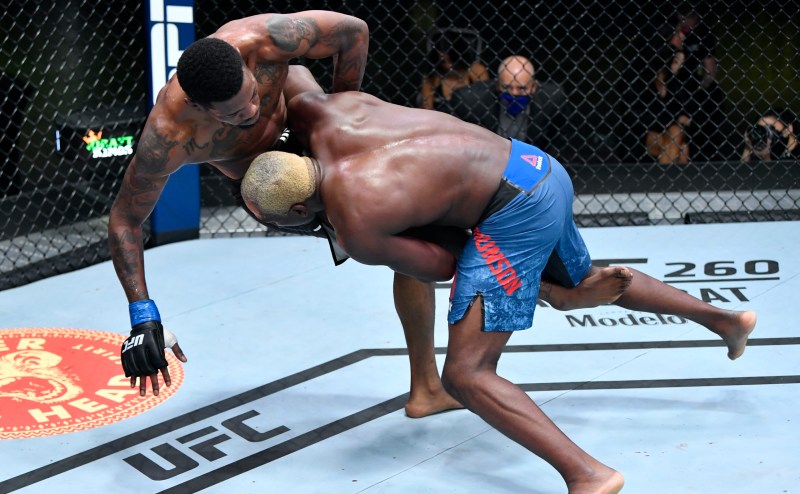
The money has always been in pay-per-view events for the Ultimate Fighting Championship (and for the broader MMA world) — until the UFC Fight Night franchise came along, that is. Like boxing’s high-dollar “Thrilla in Manila,” “The Rumble in the Jungle,” “The Brawl in Montreal,” and countless other cleverly named matchups, the UFC made its bones in big PPV-only shows. Red-carpet prestige, celebrity attendance, all-star fight cards, and healthy post-fight VHS sales were all part of the UFC’s business model in the ’90s and ’00s. But as the organization changed ownership and grew, raising the awareness of mixed martial arts as it refined and standardized its format, the fans clamored for more. And so like many other forms of entertainment in the early- and mid-aughts, it started with reality TV.
Related Content
UFC President Dana White, who assumed his role in 2001 after convincing childhood friends the Fertitta brothers to purchase the failing organization for a paltry $2 million, deserves as much credit as anyone for expanding the scope of the UFC. Initially, the biggest change was the tempo of PPV events, with nearly the same number of specially billed fights held in the first four years of White’s tenure as had taken place in the company’s previous eight-year history. But names like “The War of ’04,” “Vendetta,” “Onslaught,” and the like display the spectacle-like philosophy designed to lure a small but growing fanbase to pull out credit cards and call their cable providers.
That all changed in 2005 when The Ultimate Fighter, a reality television show featuring aspiring fighters, debuted on the late Spike TV. It was an instant hit, providing a front-row seat to the inner workings of the fight life as two teams of athletes trained and fought under the watchful eyes of UFC legends and champs Chuck Liddell and Randy Couture. (In one of the more bizarre additions, one-hit-wonder Willa Ford announced the various segments.)
While the show garnered considerable viewers, the pinnacle was in the Ultimate Fighter: Team Couture vs. Team Liddell Finale, which was also shown on Spike. While the headliner of the night was UFC Hall-of-Famer Ken Shamrock against future champ Rich Franklin — a significant draw for essentially a freebee fight — the highlight of the event was the penultimate match. Featuring the final two everymen from the show that viewers had come to respect over the season, what was supposed to be a calculated battle of styles turned into a three-round slugfest akin to a Rocky movie. It has since become legend and the subject of many, many documentaries.
TUF and its final fight were a cultural phenomenon, and the show is largely credited for introducing the modern sport to its current fanbase through the medium of basic cable. But from a business perspective, it proved a lucrative segue from PPV to television, which fed back into PPV in a Human Centipede-like loop. The UFC was forming its own stars while documenting (and profiting from) their rise. Its Fight Night series owes the prototype TUF not a small debt.
The first UFC Fight Night, titled UFC Ultimate Fight Night, took place in August 2005, less than four months after the TUF finale. As opposed to the normal PPV model, it was broadcast on Spike free to anyone with access. It was essentially one big main card without a headliner fight, and all eight matches of up-and-comers were three rounds, a length normally delineating a non-headlining and non-championship bout. While any fight is serious for the two men in the cage, Fight Nights became foundational rather than flashy, useful in building a fighter’s name with fans and rapport with White simultaneously. Think of these events, at least initially, as a kind of second interview, allowing green fighters to build confidence while the UFC could ferret out bum picks in a low-stakes, small-budget event instead of a massive PPV shindig. They’ve also evolved into highlight factories from which the UFC’s marketing team can pull when a fighter makes it to the PPV Big Show.
Recommended Reading
- Do UFC Fighters Wear Cups?
- How Long Is a UFC Fight?
- How Much Do UFC Fighters Get Paid?
- How Many Rounds Are There in a UFC Fight?
- What Does No Contest Mean in UFC?
Over the years, the UFC has continued to expand as a worldwide brand to the point that it’s synonymous with its own sport. It holds a hegemony on top talent and remains the ultimate goal for aspiring athletes and a shining mark on a resume for punch-drunk vets plying their wares overseas. And with this power, all roads lead through Fight Nights.
From Spike, Fight Nights were moved to FX and then Fox Sports before ESPN locked up a five-year, $1.5 billion deal in 2018, which has migrated the sport and its back catalog to the ESPN+ streaming service. As part of its contractual obligations, the UFC must put on 30 events a year, and many of these are fulfilled with Fight Nights. While the headliner match has been expanded to a full five rounds in keeping with the overarching format and there are now up to 12 matches split between preliminary and main cards, little else has changed beyond the ever-increasing viewership. The Fight Night brand continues its vital place in the UFC ecosystem as a stepping stone for young fighters to one day, hopefully, book a big-paycheck PPV event. But for the fans as much as for the fighters, it’s a kind of reality show in which the next great UFC stars will emerge. In that way, over the past 15 years, little has changed.



